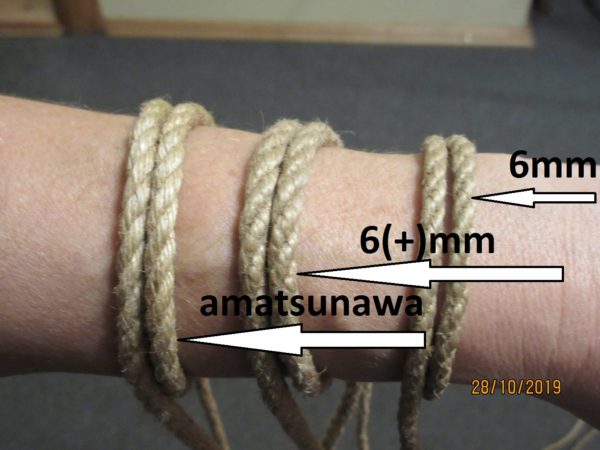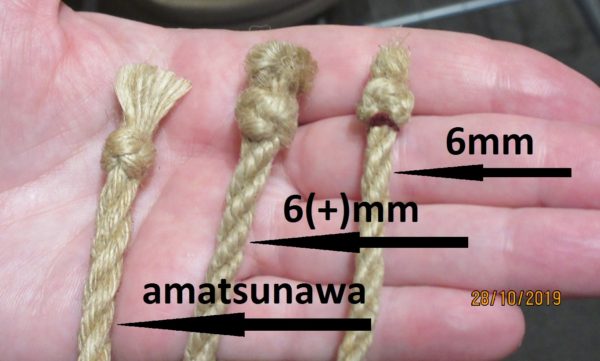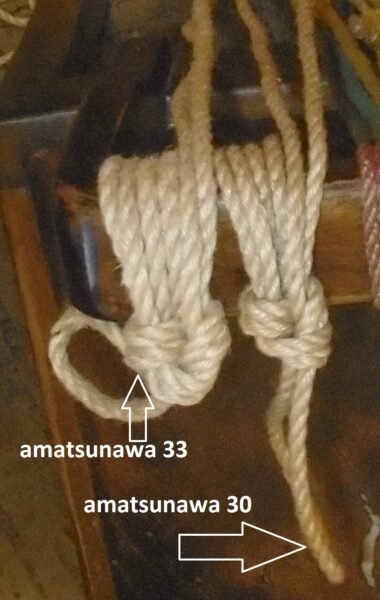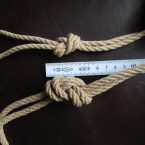Here you find information about the ropes and rope
maintenance pastes that we offer, as well as an advice on
rope selection, maintenance and storage.
1. Jute ropes (coloured and un-dyed)
2. Amatsunawa ropes (top quality Japanese ropes )
3. Pastes/waxes (choose your own scent)
4. Maintenance and storage advice
5. Shibari ring – wooden ring for laying suspension ropes
Please enquire about shipping costs.
We aim to dispatch uncoloured rope next working day. The died ropes are dispatched within 2-3 working days. Our jute ropes are suitably soft, with optimum friction. The tips are finished with a traditional azam musubime (thistle knot), short or frayed ends.
The ropes are then treated with wax and tsubaki oil, a recipe of Japanese craftsmen. This gives the rope a pleasant aroma, a choice of fragrant oils are available.. The treatment lessens dustiness as well as shedding, reduces friction on the skin when drawing the rope through fast and significantly increases rope’s durability.
We offer jute ropes with a diameter of 6mm, 6 (+) mm, 8mm, and top-shelf ropes – amatsunawa
All ropes are made to order, there is no sale of ropes “from the shelf”.
We offer jute ropes in sections of any length.
Shipment of uncoloured ropes immediately after payment of the order, ropes dyed within 2-3 days.
Prices of un-dyed jute ropes:
– size 5 mm – 4,-PLN/ m (rope diameter in this size ranges from 5.0 mm to 5.3 mm)
– size 6 mm – 4,-PLN/ m (rope diameter in this size ranges from 5.6 mm to 6.0 mm)
– size 6 (+) mm – 5,-PLN / m (rope diameter in this size ranges from 6.3 mm to 6.6 mm)
– size 8 mm – 5,-PLN/ m (rope diameter in this size ranges from 7.7 mm to 8.0 mm)
– amatsunawa 30 – 6,-PLN/m (rope diameter in this size ranges from 5,6 mm to 5,8 mm)
– amatsunawa 5,0 mm – 8,-PLN/m ( rope diameter 5,0 mm)
– amatsunawa 5,5 mm -8,-PLN/m (rope diameter in this size 5,5 mm)
– amatsunawa 6,0 mm -8,-PLN/m (rope diameter in this size 6.0 mm)
– jouyoku size 30 – 12,-PLN/m (rope diameter in this size ranges from 5,5 mm to 5,6 mm)
– jouyoku size 33 – 12,-PLN/m (rope diameter in this size ranges from 6.0 mm to 6.1 mm)
Prices of dyed ropes are higher than the prices of ropes in natural color by 1,oo PLN / m, but not less than 50 PLN for each ordered color. Dyeing the tips (brushes) red or blue 1,-PLN for a brush.


Visual comparison of jute ropes in three sizes.
The 6mm rope size is the most commonly used rope size in shibari practice.
This is the size we particularly recommend.
The rope size 6 (+) mm is noticeably thicker, what follows is stronger, it is also the most delicate of all sizes, the most rigger-friendly hand, some people prefer for aesthetic reasons a rope thicker than 6mm and for them it is designed rope.
8mm rope is designed for these ties, where we want to achieve the effect of a visual “primitive” ties, creates large knots, now this size comes out of common use in practice shibari, but still appreciate him practicing bondage not necessarily in the style of shibari, we leave this size ropes in our offer for people with specific requirements.
Amatsunawa – for people with very sophisticated tastes we offer a rope Japanese in sizes:
– amatsunawa 30 – rope diameter in this size ranges from 5,6 mm to 5,8 mm
– amatsunawa 5,0 mm – rope diameter 5,0 mm – This ropes may be suitable for ground or suspension work with very lightweight bodies, for ties fingers, hair, for very extensive weaves.
– amatsunawa 5,5 mm – The most universal size for all applications.
– amatsunawa 6,0mm – rope diameter in this 6.0 mm – This ropes may be suitable for ground as well as for suspension work with body weights of 70.
We also recommend this diameter for those prone to bruise easily.
A rope with a smaller diameter gives smaller knots, more delicate weaves of bonds.

Amatsunawa is probably the only rope in the world produced exclusively for the needs of shibari. This means that from the stage of jute growing on plantations, through the production of yarn and the production of the rope itself, the entire process is carried out under supervision and certification, so as to obtain a rope with optimal properties for shibari. The production does not use insecticides and molds, and above all, JBO (a substance that must be removed by treatment in other ropes) is not used.
The rope has a bright color, with a slightly golden sheen, a very even diameter, is smooth, in use it quickly “gets through” and becomes even “friendlier” to the touch.
We offer this rope ready for use, with tips in the form of a “thistle flower” weave, in any sections.
We currently offer a new type of amatsunawa:
The Japanese manufacturer has improved its product to meet the expectations of shibari practitioners. Now amatsunawa has an even smoother weave, the degree of twist provides an ideal compromise between a small twist, i.e. a soft but susceptible to damage rope, and a larger twist ensuring durability of the rope. The golden shine has become even more visible, the color of the rope is brighter, the rope does not tend to twist, and dusting has been reduced to almost zero.
The new amatsunawa is marked with a name and the diameter (e.g. amatsunawa 6.0 mm), unlike the previous type of rope where the name and the number of strands were given (e.g. amatsunawa 33).
At the moment, from the previous type of amatsunawa, we only offer the amatsunawa 30 rope – while stocks last.
Jouyoku 30 and Jouyoku 33
Luxurious asanawa rope, made of the highest quality Tossa jute, the yarn has been specially developed for prolonged skin contact loosely twisted, ready to use, condition with a mixture of jojoba oil and Mokurō wax to enrich color, fluffiness, shine and strength to obtain increased abrasion resistance and low maintenance costs, silky shine rope, non-dusting, made and conditioned in Japan with jute dedicated to the needs of shibari, without the use of chemicals, burned rope. Hypoallergenic with the Vege certificate.
A luxury designed and developed especially for shibari, with a silky touch and a fresh natural fragrance , intended for experts.
Imported to order, hence the waiting time for the contract to be completed up to 2 weeks.
We also offer amatsunawa rope with colorful ends:
In the beginning of your journey developing your skills, you will not to expect to perform suspension, 6mm rope is enough to start with. Ropes of this diameter (and even the trend now for using slightly thinner ropes ) allow for the creation of more interesting ties and patterns. The resulting knots are clearly smaller than on ropes with a diameter of 8 mm.
The picture below shows the difference in size of the same knot tied with 6 mm and 8 mm diameter ropes.

In shibari it is assumed that the basic length of the rope is 7-8 m. This is because traditionally a double folded rope could be traversed by two full spans of a male’s arms. Longer ropes may cause problems when pulling the rope
through when tying. The practice of joining two ropes together is used to extend the rope.
The kit we would recommend for a beginner is:
– 4 pieces of rope 7-8m (depending on the size of the
person being tied), 3 for all of the torso and 1 for a leg
– 4 pieces of rope 3-4m, for attaching limbs to furniture,
equipment, simple ties the of wrists and legs.
We recommend ropes made of special hemp yarn to all those who perform suspensions in their practice.
A hemp rope of this diameter has a breaking strength similar to an 8mm jute rope, it is also more durable, less susceptible to abrasion and deformation of the weave, and as a result its strength does not decrease during use as quickly as jute ropes.
The ropes we offer are made of a special yarn, they do not resemble ordinary hemp ropes. New ropes quickly “run in” during use, lose their stiffness and elasticity, become soft and skin-friendly.
We offer hemp rope – in a natural color, which is much lighter than jute rope (almost white).
We can also make dyed hemp ropes on request.
The price of undyed hemp rope is PLN 5/m, the price for dyeing is PLN 1/m, but not less than PLN 50 for each ordered color.
Sections in any length.
A specific feature of hemp rope is its smell. It is so strong that it even breaks through the aroma of our wax pastes and results in an original mixture.
……………………………………………………………………………………………………………………
We offer coloured ropes which are useful when we need to match them to costumes, tastes, etc, and we can also
provide these. The basic colours are dark jute colour, red and black. These colours are ready for an immediate despatch. To special order we can also supply ropes from our vast colour selection. Please see the chart below.
Latest addition to our rope selection are golden ropes.
We offer a special wax for rope maintenance.
Ropes made of natural fibres (jute, hemp, wool) lubricated from time to time have a unique scent. They are also more durable, acquire the right friction, get tangled less and have less tendency to burn the skin. Lubrication of ropes also reduces the shedding of fibres and dustiness. The price of one container of 30ml is 30,-PLN. The content of one container is lasts for about 100 applications on 8m rope. Waxes offered by us are made according to the old rules of Japanese craftsmanship and are based on natural beeswax, tsubaki oil and other aromatic oils, if requested.
We make pastes using your chosen aromatic oil. At the moment we offer the following aromas:
1. Natural
2. Lemon Grass
3. Lavender
4. Opium
5. Sandal tree
6. Myrrh and incenses
7. Bergamot
8. Vanilla
9. Cedar wood
Tins with 30ml of the selected paste, will be sent in secure packaging. Please enquire for postage costs.
The following video shows how to lubricate rope with our pastes:
How to lubricate the rope with our paste
Cleaning/washing
Jute and hemp ropes offered by us can be washed and cleaned. Fine impurities can be removed by wiping the rope with a cloth dipped in water with a hint of shampoo and tightly wrung out.
The bigger stains can be removed by washing the rope like a cotton shirt. If you really want to they can even be boiled without fear of destroying the rope. The rope, after washing, should be dried under constant tension. If there are kinks in the places where the rope was attached, remove the rope wrap it around a round metal object (carabiner, eye, pole, etc.) and pull through several times.
Ropes, after washing or from time to time, should be treated with a wax-based paste or oil. Light moisturising of the fibres extends the life of the rope, limits its shedding, reduces friction when pulled, and by the way, you can add an attractive aroma.
Storage
Generally store like cotton clothes – in a dry, airy, sunexposed location.
– the ideal method is to store ropes freely suspended and lightly loaded (in reality, few have such opportunities)
– if the ideal is out of reach, try to get as close to it as possible, in a dry place, certainly not in a plastic bag squeezed into the garage or basement corner 🙂 From time to time, if the ropes tend to twist, it is important to
stretch them. To do this, attach one end of the rope to a fixed point. Tightly grip it with a piece of cloth so you not to burn your hand (you can use the wax at the same time) and pull the whole rope through the cloth to its free end. As you pull along the rope the free end will start to spin and release any tension.
Repeat this several times.
4. Shibari ring
5. Rescue scissors for cutting ropes.
Safety first – usually everything goes well, but if something goes wrong and the ties have to be removed immediately, the prudent person is always insured – he has the right tool.
Knives do not work, special rescue hooks for cutting car belts do not work with ropes. We recommend special “rescue” scissors. The serrated blades cut easily any rope, even hemp, have rounded and cleverly contoured tips, are strong, light and small, easy to stuff into a bundle of ropes.
We offer them for PLN 30 per item.
We hope our ropes will bring you lots of satisfaction and fun
……………………………………………………………………………………………………………………………………….
Translation and editing of the English version: MsDupka & Ikigai
Webmaster: MrrWhite
© nawado.pl
You must be logged in to post a comment.